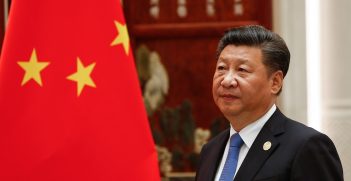A Response to the Coronavirus Pandemic Has Stumped EU Leaders

With Europe at the epicenter of the COVID-19 pandemic, Brussels has been slow to come to the aid of member states. The EU must cope both the the gap in funding left by the departure of the United Kingdom and with the fact that some members are far worse off than others.
We all face a profound need to invent something new, because that is all we can do… Emmanuel Macron, president of France
By a long chalk, the French president is the standout G7 leader of these times. In Washington, the odious Donald Trump provides pure vaudeville, except it’s not funny. Xi Jinping of China showed early promise, but his illegal seizure of islands in the South China Sea and his cover up of the early days of COVID-19 make him not only culpable but no longer trusted. The real loser in the pack is Boris Johnson who abandoned WHO advice to “test and trace” for COVID-19, instead boasting he had shaken hands with suspected victims, and then caught the virus himself. He returned to work on Monday April 27 after a month away, following five days in intensive care.
But, as the Financial Times reports, in an exclusive interview recorded in the ornate salon d’or at the Elysee Palace, even Macron feels stumped. Though his political life has been consumed with developing and implementing strategies, Macron expressed his frustration at the paucity of action within the European Union to deal both with the immediate impact of the pandemic across the 27 member nations as well as the gathering storm of the prospect of a depression worse than anything since1929.
As we know, the new leadership of both the EU and its operating arm, the European Commission, have been slow to grasp the enormity of the mounting political and financial crisis facing the continent in the early months of this year. As the coronavirus swept into Europe in March, making it the epicentre of the pandemic, any initiatives that emerged from Brussels were dwarfed by the actions of national leaders. Not only did COVID-19 strike unevenly, but we have seen widely different strategies applied to fight it.
When Brussels did kick into gear, it became clear that two countries in particular desperately needed help – Italy and Spain – especially the former. While arguments raged among the 27 EU members on the size and nature of the help to be offered, those suffering the most were starting to question the benefits of the “great European project” – especially as its second largest economy, the United Kingdom, had abandoned the “show” on January 31, with a not insignificant impact on the EU budget.
Macron captured the mood in his interview with the Financial Times, suggesting those hardest hit don’t feel protected by their better off European neighbours. Repeatedly thumping his desk in front of Financial Times’ Paris correspondent Victor Mallet and editor Roula Khalaf, Macron said, “When you have an epidemic, they tell you to deal with it. Oh, they’re really nice. They’re in favour of Europe when it means exporting to you the goods they produce. They’re for Europe when it means having your labour come over and produce the car parts we no longer make at home. But they’re not for Europe when it means sharing the burden.”
The shocking difference in the impacts of COVID-19 on EU member countries can be seen from the statistics. The countries with the highest number of deaths per million of population were Spain, Belgium, and Ireland, with the United Kingdom and Germany the least affected in the top ten. But looking at the total number of deaths, Spain and Italy account for the second and third largest number of fatalities (though each have less than half of the deaths in the United States).
When it comes to preventing fatalities, Germany does best with only 67 deaths per million people, closely followed by Portugal with 84 per million. Portugal’s Iberian neighbour has 482. Despite a high number of cases, Ireland and Switzerland’s fatalities are lower than average. Britain’s figures are suspect because it is believed they have not yet calculated the full extent of the toll in care homes.
Scientists at Britain’s Oxford University have begun human testing of a vaccine they developed with UK government support. The diagnostic unit of Swiss pharmaceutical giant Roche is trialling treatments and has antibody tests in production to detect people who may have contracted the virus but shaken it off. But clinicians fret that the EU has not established an agency like the Biomedical Advanced Research and Development Authority in the US, which helps companies and universities develop treatments, and sometimes kick starts manufacturing projects.
But it is the prevention of economic ruin for businesses and employees hit hard by lockdowns where the EU faces the most criticism, particularly from President Macron. Yet Brussels has not been without ideas. One is to reshape the European Commission’s seven-year budget (known in the jargon as the MFF – the Multi-annual Financial Framework). Ursula von der Leyen, the German who is now the Commission president, wants it rewritten next year to incorporate what some dub a “Marshall Plan” to reconstruct Europe. The EU’s southern members like the sound of this, but the 27 members have been struggling to come to terms with current demands, as well as plugging the hole left by the loss of the UK contribution.
Another much talked about concept is a European Recovery Fund, with many suggested constructs in funding, administration and implementation. Many questions remain unanswered. Who would fund it – states, corporates, investors, or a mixture of all three? Should it be part of a global effort, extending to the poorest countries? How much would need to be raised? France has suggested a trillion euros; Spain added 50 percent to that number and thought the cash should come as grants rather than loans.
Finally, after weeks of discussion, even wrangling, EU leaders agreed at a four-hour video meeting last Thursday (April 23) to establish a trillion euro emergency fund to recover from the pandemic. Their decision came after European Central Bank Governor Christine Lagarde told leaders the pandemic could cut between 5 percent and 15 percent of euro zone economic output.
But Macron cautioned that the problem that has split leaders for weeks – whether to simply grant money or provide loans – remained. He told the Paris press corps that “divisions remain”. This and many other questions remain unanswered.
In this game of political tennis, the ball has been tossed to the umpire, Ms van der Leyen. No commission president has ever faced so daunting a challenge, and time is not on her side. If she does not act fast, disillusion with the Brussels club can only morph into disintegration. She will need all the help she can get from the president of France, and the hesitant German chancellor, Angela Merkel.
Colin Chapman is a writer, broadcaster, and public speaker who specialises in geopolitics, international economics, and global media issues. He is a former president of AIIA NSW and was appointed a fellow of the AIIA in 2017.
This article is published under a Creative Commons License and may be republished with attribution.





